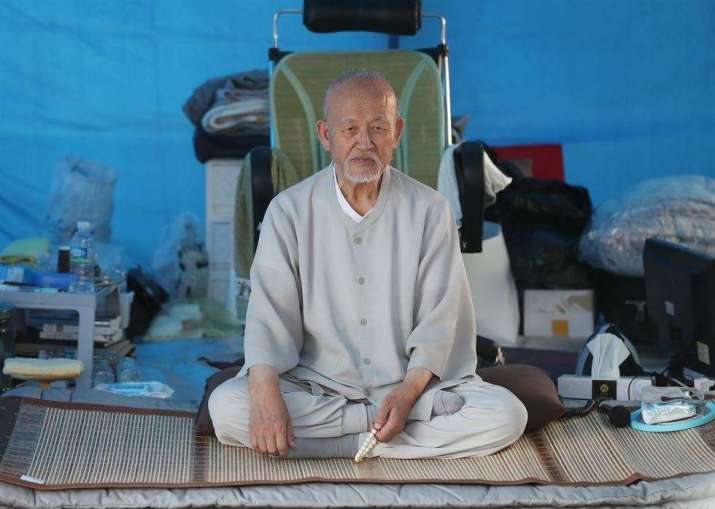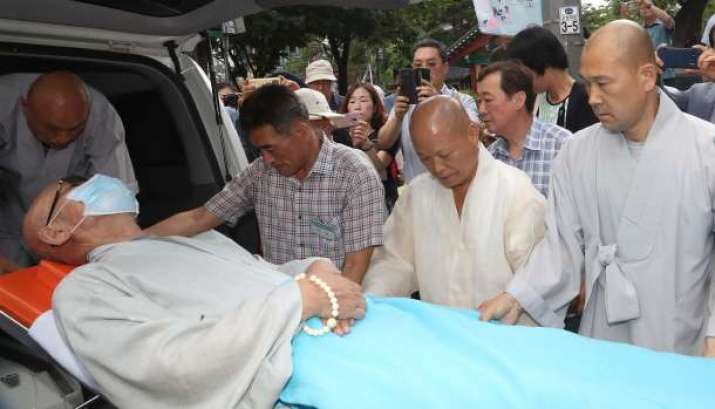
The presiding executive of the Jogye Order of South Korea has issued a public apology for the series of scandals that has enveloped the order and his leadership of the organization. Venerable Seoljeong, who heads South Korea’s largest Buddhist order, stated that he would not step down from his position immediately, however, insisting that the allegations against him are untrue.
The reputation of the Jogye Order has been shaken by a barrage of allegations of impropriety against 76-year-old Ven. Seoljeong since his election in October last year, including lying about his academic background, misusing and embezzling the order’s funds, and secretly fathering a daughter out of wedlock.
“I feel heavy responsibility for having put the sect in this difficult situation. I sincerely apologize for disappointing and worrying people,” Ven. Seoljeong said during a press briefing on Friday. “Since [the allegations] are not true, I expect the doubts to be cleared up soon. I believed the truth would definitely come out. I will humbly accept any opinion from the sect’s members to break through this current situation in a wise manner.” (Yonhap News Agency)
The Jogye Order is a school of Seon (Zen) Buddhism that traces its roots back 1,200 years to the Unified Silla (also known as the Later Silla) kingdom (668–935). The Jogye school as a distinct entity emerged in the late 11th century when the monk Bojo Jinul, credited as the school’s founder, sought to combine Seon practices with the theological underpinnings of sutra-based Buddhist schools, including Korean Pure Land Buddhism. The order now represents the largest segment of South Korea’s Buddhist population, administering about 1,900 active temples and more than 13,000 monastics nationwide.
The supreme patriarch of the Jogye Order is 82-year-old Ven. Jinje, although the organization’s power is concentrated in its administrative division, which controls all financial and administrative decisions.

Meanwhile, a prominent Buddhist monk, 88-year-old Ven. Seoljo, was admitted to hospital on Monday after ending a 41-day protest fast to demand reform within the Jogye Order. He released a statement on Monday before submitting to medical attention that criticized senior monastics within the Jogye Order for failing to implement internal reforms.
“The order’s leaders kept mum and gave up on their responsibilities. . . . The majority of good monks should stand up to correct the sect,” said Ven. Seoljo. “During the [hunger] strike, I felt most rewarded when [the country’s] Buddhists came together to demand the order set right. I hope they continue to help build a clean Buddhist order.”
The monk began his protest fast outside the head Jogye temple in central Seoul on 20 June, calling for the order to be reformed and for its senior executive, Ven. Seoljeong, to step down and take responsibility for the allegations of embezzlement and corruption.
According to media reports, Ven. Seoljo was determined to continue his protest, but was persuaded to stop for the sake of his health by people around him. “His health is in serious condition as various health indicators have deteriorated,” an unidentified source close to the monk was quoted as saying on Monday by Yonhap News Agency. “Regardless of his will, we will take him to the hospital today.”
Ven. Seoljo reportedly sustained himself on water and bamboo salt during his fast, which was undertaken amid a punishing heatwave that has gripped the country for several weeks.
“He has lost more than 15 per cent of his weight. His blood pressure has dropped and he is suffering from an irregular pulse,” said Dr. Lee Bo-ra, sapping from the hospital where Ven. Seoljo is being treated. “Continuing the hunger strike is likely to put his life at serious risk.” (Yonhap News Agency)
A nationwide association of Buddhist monks has also staged a prostration protest at the main Jogye temple, which has been joined by Buddhist nuns and college students. A number of other Buddhist organizations are also reportedly planning demonstrations to call for Jogye reform and for Ven. Seoljeong’s resignation.

According to data from the 2015 national census, the majority of South Korea’s population—56.1 per cent—holds no religious affiliation. Christians make up the largest religious segment of the population at 27.6 per cent, while Buddhists account for 15.5 per cent.
See more
Chief of Korea’s biggest Buddhist sect apologizes over corruption allegations (Yonhap News Agency)
Monk demanding largest Buddhist sect’s reform stops hunger strike due to health issues (Yonhap News Agency)
Korea’s largest Buddhist sect in chaos (The Korea Times)
Prominent monk admitted to hospital (Korea JoongAng Daily)
Jogye Order of Korea Buddhism














